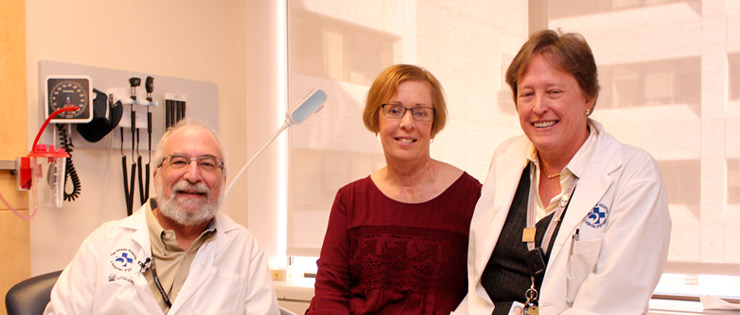
A severe autoimmune disease that put Kemptville resident Anne Scott (centre) on life support a dozen times is now in remission thanks to a stem-cell procedure, overseen by Dr. Harold Atkins (left) and Dr. Elizabeth Pringle.
Anne Scott had one wish: to live long enough to see her daughter get married in September 2001. Her odds didn’t look good. She had been on life support 12 times in the past year.
“If I caught a cold or any respiratory infection, it could send me into a crisis,” said Scott.
The former nurse has an autoimmune condition called myasthenia gravis. This rare disorder interrupts the communication between her muscles and nerves, making breathing or swallowing difficult.
Usually this condition is quite treatable. But five years after she was first diagnosed, the usual methods had stopped working. So Scott’s neurologist, Dr. Elizabeth Pringle, referred her to Dr. Harold Atkins, who was using stem cells to restart the immune systems of patients with multiple sclerosis and other autoimmune diseases.
“Anne’s is the first recorded case of using this procedure to treat severe myasthenia gravis,” said Dr. Pringle, a neurologist at The Ottawa Hospital and associate professor at the University of Ottawa. “It was done to save her life.”
In June 2001, Scott’s diseased immune system was wiped out with strong chemotherapy, followed by a transplant of her own stem cells. She made it to her daughter’s wedding, even though she was back in hospital a week later.
“That period after the transplant was the worst I’d ever felt,” said Scott. “Things didn’t change overnight.”
She started to notice a change six months after the transplant. Today, her myasthenia gravis is in remission.
Drs. Atkins and Pringle recently published a study showing that Scott and six other myasthenia gravis patients who received the treatment no longer have symptoms.
“Their lives are not bothered by seeing doctors all the time, or by dealing with the muscle weakness,” said Dr. Atkins, a stem-cell transplant specialist at The Ottawa Hospital and an associate professor at the University of Ottawa. He noted that the treatment has life-threatening side effects, and is only for patients with severe and untreatable forms of the disease.
These days, 58-year-old Scott enjoys spending time with her grandchildren and volunteering at the Kemptville District Hospital.
“Things just fell into place for a reason, but you know I’m one of the lucky ones,” she said. “I just hope that stem cells can go on to help others with incurable diseases.”

Support patient care and research at
The Ottawa Hospital


 To reset, hold the Ctrl key, then press 0.
To reset, hold the Ctrl key, then press 0.